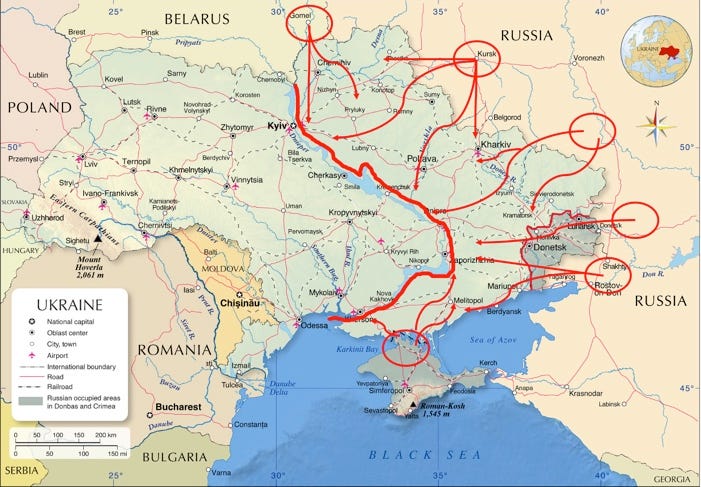Russia-Ukraine, the 11th Hour
A Russian invasion is imminent. Three weeks ago, I'd have said the limit of any incursion would be the rebel-occupied areas, however, three things now make me think that they might not stop there.
Talks with Russia in Berlin the day before yesterday failed. Russia has confirmed it is withdrawing non-essential staff from its embassy in Kyiv.
With the Russian State Duma due to discuss on Monday whether to ask President Putin to formally recognise the occupied areas of Luhansk and Donetsk – the so-called Luhansk and Donetsk people’s republics - in Ukraine, we are now at the eleventh hour. Russian military occupation of part of Ukraine is imminent.
Russia now has up to 150,000 troops massed on Ukraine’s borders. My own prediction is that we’ll now see:
Pro-Russian rebels in Luhansk and Donetsk request Russian ‘protection’ – This is imminent (they did declare independence in 2014, although nobody recognised them as such)
The Russian State Duma will request on Monday that President Putin formally recognises the two so-called republics
Russian forces will enter and secure the rebel held areas
If – if – Russian forces stop at that point, there is unlikely to be a shot fired. There are no Ukrainian troops in those areas and very few pro-Kyiv civilians. The diplomatic response will be more vocal than meaningful; any additional sanctions will be relatively mild. Why? Because such a move by Russia would simply consolidate the reality on the ground, and the Ukrainian government knows that the likelihood of those areas ever coming back under its control is next to nil. That’s the ‘real-politique’ of the situation.
But what if Russian forces don’t stop there?
Three weeks ago, I would have told you that they would stop there and that the limit of any Russian incursion would be the rebel-occupied areas, however, three things now make me think that they might not stop there:
The concentration of Russian forces is far more than is required to simply occupy the rebel occupied areas and also conduct diversionary feints from the north, from Belarus, and from the south, from Crimea.
The Kremlin’s demand that NATO guarantee Ukraine would never join the Alliance, combined with statements that NATO’s rejection of that demand will be met with “a robust and decisive response” was clearly and deliberately orchestrated - The Kremlin knew full well that NATO could not agree its demand, so why else make it? Moscow wanted to create a pretext.
The Kremlin’s presentation to the Russian public that tensions in the area are caused by NATO expansionism and the failure of Ukraine to adhere to the letter of the Minsk Agreement is not accidental.
These three things suggest to me that the Kremlin intends not only occupy the rebel held areas of Ukraine but is also considering the establishment a militarised security, or buffer zone beyond its own borders, thereby distancing potential NATO expansion from Russia itself. Establishing such a zone will inevitably lead to heavy and protracted fighting – easily the heaviest fighting witnessed by Europe since 1945. It may well also involve projecting a threat against the Ukrainian capital, Kyiv, as well as an offensive from Crimea, thereby forcing the Ukrainians to fight on three fronts and preventing them from concentrating their forces.
The aim of establishing such a buffer zone would explain the lay-down and character of the military deployments we’re seeing in Russia, Belarus, and Crimea, and would match the rhetoric addressed to both the international and the domestic audience by the Kremlin.
How far would such an operation project? It’s difficult to say, but presently, Ukraine projects a huge salient into the territory of the Russia/Belarus. From the perspective of Moscow, the idea that salient may one day be part of the NATO alliance is unacceptable. So, I think we can assume the Kremlin would like to straighten out the line from Belarus down to Crimea. In that case it would be necessary to establish a defensive line running north to south, and one option is for Russian forces to establish such a line along the eastern bank of the Dnieper River. Such an objective would have the advantage of linking up Crimea in the south, Donetsk & Luhansk in the east, and the Russian forces in Belarus in the north.
The Kremlin certainly has the resources now on the ground to attempt a multi-pronged invasion from those directions, but does Putin really want to engage in the all-out war with Ukraine all that will inevitably lead to? He’ll almost certainly win it, but the cost in blood, and to the Russian economy will be massive. Sadly, as I watch the build-up, I increasingly suspect he’s considering it. Such a move would be all the more serious as, don’t forget, the Ukrainian capital, Kyiv, sits on the Dnieper.
Time will tell, but I am quite sure that we’ll not have to wait long to find out. There are high level diplomatic meetings planned for Monday, and also, on Monday, the Duma will decide whether to request that President Putin recognise the rebel held areas in Ukraine. So, my money is on Tuesday 15th February, or Wednesday 16th February.





Henry , this is extremely well presented and your analysis in right on. Come next week waiting for the other shoe to drop. Cheers mate.